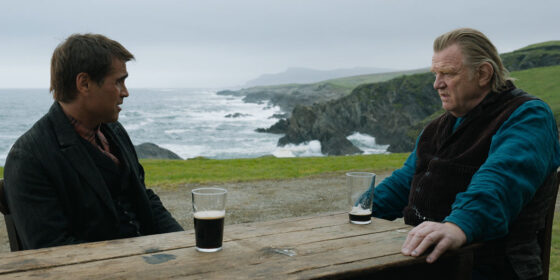TIFF 2022 | The Banshees of Inisherin (Martin McDonagh, Ireland) — Special Presentations

By Clara Miranda Scherffig
The Banshees of Inisherin is a pessimistic fable told in the way of a black comedy-drama. In the style of Martin McDonagh’s previous efforts, the film exists as a self-contained, odd universe that aptly plays out on an island, the fictional Inisherin on the West coast of Ireland. It’s 1923 and Pádraic (Colin Farrell) and Colm (Brendan Gleeson) are best friends. They meet everyday at the pub, until Colm doesn’t want to anymore. Pádraic is boring, Colm explains, and he’s determined to spend the time he has left meaningfully, i.e. not listening to Pádraic’s blabber about his pet donkey Jenny. But despite multiple threats of self-harm proclaimed by Colm, Pádraic doesn’t leave him alone. As civil war rages on the mainland and fires burn in the distance, drama ensues.
The film’s truly breathtaking scenery (shot on location on Inishmore and Achill Island) offers only partial relief to the human landscape, which is crowded by petty figures—fittingly representing the law and the market—and dull islanders. Saving the stage are only Pádraic’s sister (Kerry Condon), a bookish and sardonic woman who is plotting her escape to the mainland, and Barry (Dominic Kearney), the village idiot who is so not by nature but by nurture, and in fact the most emotionally perceptive of the bunch. Boredom and tedium are the island’s real banshees, reducing its inhabitants, and above all the two protagonists, to become victims of pathetic animosities.
To make a film about boredom is as original as it is ambitious, and the fratricide conflict watched (or ignored) from afar by the complacent community adds complexity to McDonagh’s vision. It wouldn’t be beyond the point to find analogies with the political isolationism observed by the US in recent years, or with the war in Ukraine in Europe. For these reasons, The Banshees of Inisherin is a noble endeavour whose timeless straightforwardness merits respect. But a film about boredom cannot be bland. The “black spice” usually running through McDonagh’s writing lights up only in seldom instances, mostly when Pádraic rebels against the meek picture that his ex-friend paints of him. He lashes out with sophisticated and wicked verbiage, and is never hesitant to express ambivalence about the new persona he has been forced to become. Roles are briefly reversed, and Colm-Gleeson proves to be an excellent sidekick in these spiteful outbursts. “Maybe I like him again,” he says, invigorated by malice. Set the laughter aside though, it’s a shame that the best thing in such a pacifist film is actually the execution of violence.


